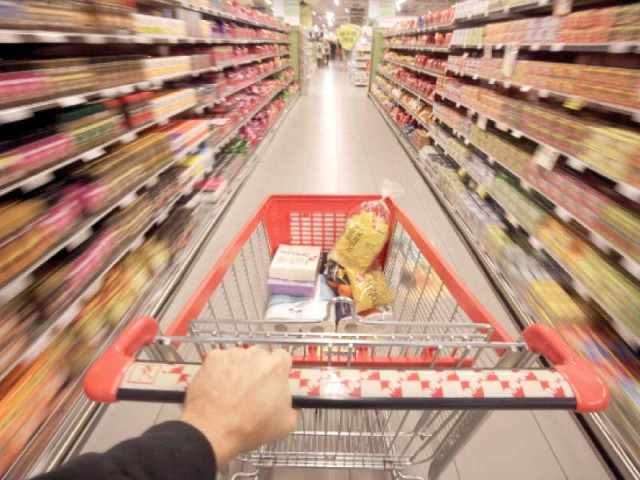Citizens’ buying power compromised as inflation climbs
Monthly groceries become increasingly unaffordable; unchecked prices vary from area to area

Despite Prime Minister Imran Khan vowing to control inflation until the next budget and touting surprising relief packages for the population, the average person in the port city claims that the current government has severely impacted its buying power.
Owing to surging inflation in Sindh, reflected in skyrocketing food and grain prices, the many who once used to buy monthly groceries, have now been forced to shop in smaller proportions on a daily or weekly basis.
In this regard, the Sindh government had urged local authorities and concerned agencies to intensify action against hoarders, stockpilers and those who choose to profit from rising food prices. However, none of that has yet had any reassuring impact on the local economy, where prices continue to balloon as buying power slumps.
According to Farida Khatun, a resident of Kemari, a low-income neighbourhood in the city, she was already distressed by the recent pandemic, but now widespread unemployment and rising inflation have also begun breaking her back. “We used to make ends meet somehow, but in the last 3 three years it has been next to impossible to get through a single month without borrowing money. Salaries have depleted and housewives like me are always struggling to budget household expenditures,” she told.
Similarly, Kashif Khan, a resident of the Liaquatabad area, believes that the chief reason for the recent price hikes is the inactivity of the Price Control Bureau and the district administration across Karachi. “Action is only taken to complete the formality. While shopkeepers are charging exorbitant prices for groceries, that also vary from area to area depending on how posh or poor the area residents are,” he expressed.
Speaking in the regard, Naeem, who owns a grocery store in a mixed-income neighbourhood, said that he’s observed a significant drop in the number of people who used to spend on monthly groceries, with a majority now only being able to afford daily rations. “Oftentimes, as neighbourhood store owners, people ask us to sell them grocery on a credit basis. These are own neighbours, so we can understand their struggle and it is not too far from us,” informed the grocer.
Read More: Imran's eyewash relief package to add to inflation: Abbasi
According to Shahnaz Akhtar, a housewife, after the continuous rise in petroleum prices, prices of food items have also gone up. “The price of a five kilogramme mill-flour bag is rupees 400 to 450, open flour 70 to 80, oil and ghee bags range between 400 to 450, Chicken rupees 400 per kilogramme, milk is being sold at rupees 130 to 150 per liter and even vegetables are fast becoming out of our reach. And on top of that, all of these items are priced differently in different areas, which just shows there is no check and balance in the city,” she complained.
Per Wasim, a vegetable seller in the city, the prices of fruits and vegetables are determined on a daily basis in the vegetable market. “The prices are already steep, but we also have to take into account the additional transportation cost and other expenses to meet our own overheads,” he claimed, agreeing that prices of fruits and vegetables vary from area to area. “When the deputy commissioner, assistant commissioner or district administration raids, the price goes down for a while and we see some uniformity, but the next moment it’s back to anarchy,” he commented.
All Karachi Traders Union Chairperson Atiq Mir, while speaking on the matter, acknowledged that the purchasing power of the people has decreased and the daily wage earners are the most affected. He said that shopkeepers are also requested to keep the profit -rate low so that people can easily buy food items.
When probed regarding the concern, Bureau of Prices and Supplies Assistant Director Ali Haider Arain, said that the prices of fruits and vegetables are fixed at the retail level by the Divisional Price Controller (Commissioner). “After the approval of the Sindh Cabinet, more powers will be given to Bureau of Supply and Prices. Prices of groceries and other items have not been fixed for a long time. We monitor the prices of fruits and vegetables in the market together with other departments,” he asserted.
On the other hand, however, Adviser to Sindh Chief Minister Waqar Mehdi has said that the Chief Minister has issued instructions to the commissioners, deputy commissioners, and other district administrations and institutions to control the prices of food items. “We acknowledge the issue and concrete steps are being taken in this regard,” he told The Express Tribune in his concluding remarks.
Published in The Express Tribune, March 17th, 2022.



















COMMENTS
Comments are moderated and generally will be posted if they are on-topic and not abusive.
For more information, please see our Comments FAQ